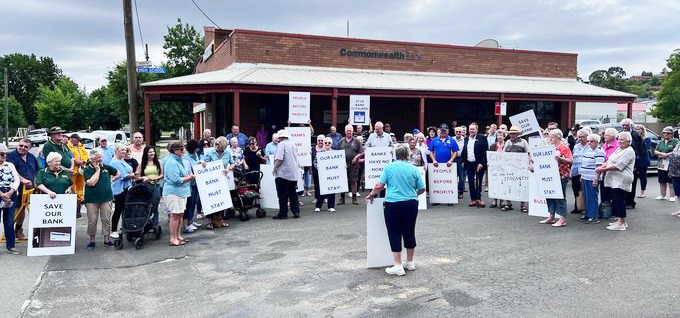The Australian Alert Service is the weekly publication of the Australian Citizens Party.
It will keep you updated on strategic events both in Australia, and worldwide, as well as the organising activities of the Citizens Party.
To subscribe to the Australian Alert Service, it's easy, and it's secure.
Lead Editorial
29 May 2024
Vol. 26 No. 22
Every Australian Citizens Party member, activist and supporter should take the time to appreciate the victory we have achieved in the outcome of the Senate inquiry into regional bank closures—a recommendation that pushes the case for a publicly owned bank, the banks’ worst nightmare!
We haven’t won the war, but we’ve won a major battle toward the goal of defeating the Money Power, the corrupt banking oligopoly that lords over governments and the people.
The old Labor Party coined the term Money Power as it fought to bring banking under democratic authority, especially through the mechanism of a national bank, which it achieved through the Commonwealth Bank.
But with the privatisation of the Commonwealth Bank by Keating and Howard in the 1990s, there’s been no check on the power of the Big Four banking cartel for more than a quarter of a century, with disastrous consequences.
The banks shifted their lending from business to mostly mortgages, inflating a massive housing bubble. They went on a tear of unbridled financial speculation, exposing the savings deposits of the Australian people to unprecedented systemic risks. And they fundamentally changed their business models, from making their money by helping their customers generate wealth, to mass-fleecing their customers through omnipresent fees and charges on everything, so even if the customers failed, the banks won. To do all this they resorted to industrial-scale misconduct, and abuse and predatory exploitation of customers, which eventually triggered the 2018 banking royal commission, but even then the banks were able to flex their muscles to stop any meaningful reforms.
Just as a mouse startles an elephant, however, it was the relatively smaller, almost sleeper issue of bank branch closures that became the banks’ weakness. Complacent in their arrogance, the banks failed to see the significance of the growing anger they were inflaming around Australia by their mass-withdrawal of essential banking services, perhaps because they had gotten away with it for so long. What they didn’t take into account is the shift in politics, seen in the growing cross-bench of parties and independents not beholden to the banks, and the repeated successes of the ACP, on drawing attention to issues like bail-in, the cash ban (with Martin North and John Adams), Australia Post and Christine Holgate, and the corruption of the bank regulators, including in relation to the Sterling First victims.
The ACP went from the 2020-21 Christine Holgate/postal bank campaign, which introduced us to the problem of communities losing banking services, to discovering the work of independent journalist Dale Webster who had exhaustively documented the extent of the crisis. Helping to publicise Dale Webster’s work led to the Coalition parties in the Morrison government trying to co-opt the issue with the pre-election stunt of establishing the Regional Banking Taskforce, but stacked with the banks! When the banks gave themselves the green light to accelerate branch closures, the ACP worked with Dale Webster, Martin North, and impacted towns like Coober Pedy, Junee, and Carnamah, to call for a real inquiry. Senator Gerard Rennick responded to that call, pushing the Rural and Regional Affairs and Transport Committee to establish the inquiry in February 2023, chaired by Senator Matt Canavan.
All along, the ACP hoped the inquiry would reach the conclusion that the solution was a public bank. The banks took every opportunity to shoot that solution down, but then their own arrogance became the biggest factor, as they proved themselves incapable of changing their approach, aside from some minor behaviour modification, even in the face of unprecedented scrutiny. In the 13 hearings, which the ACP attended in person, the Senators grew increasingly angry at the callous arrogance of the banks contrasted to the heartfelt testimonies from the communities, which proved the banks were lying.
The end result is the ACP achieved its objective from this inquiry! Now let’s get the solution implemented.
In this issue:
- Bank closures inquiry delivers! On to a post office People’s Bank!
- Albanese should appoint Christine Holgate to chair the expert panel on a public bank
- Banks blow their chance to self-regulate by betraying trust
- Additional comments—Senator Gerard Rennick
- Duggan’s fate hangs in the balance as his lawyers keep their powder dry
- Can Australia protect its citizens from our dangerous American ally?
- CSIRO nobbles nuclear (again) to support Labor’s ‘cheap renewables’ fantasy
- Europe: new moves in war to save cash
- Nuclear war danger escalates: Kiev, NATO’s catspaw, claims attack on Russian strategic radars
- We have won a battle, now we must win the war!
- The time has come for a People’s Bank
- ALMANAC: How psy-ops warriors fooled me about Tiananmen Square: a warning
Click here to find out how to subscribe. For freely available AAS articles, click here.
Click here for the archive of previous issues of the Australian Alert Service








